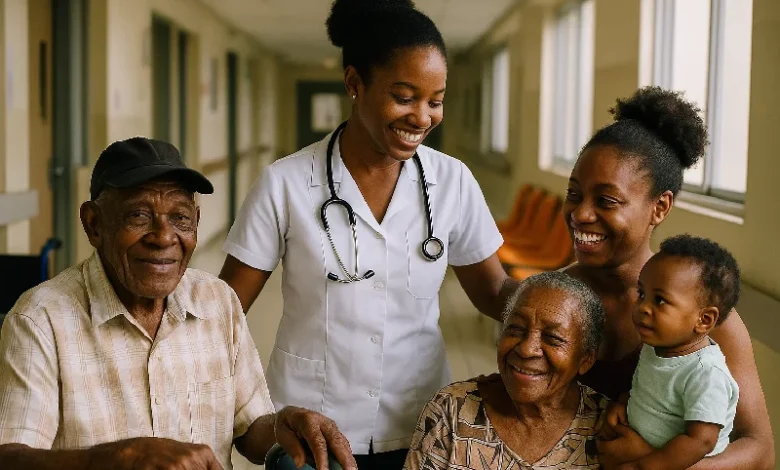Dominica Social Health Insurance Programme

The Dominica Social Health Insurance Programme is a proposed national initiative aimed at establishing a universal health coverage (UHC) system to ensure that all citizens and residents have access to essential healthcare services without suffering financial hardship. This programme, spearheaded by the Ministry of Health, Wellness and Social Services, is envisioned as a long-term solution to address the country’s healthcare financing challenges and improve public health outcomes.
Background and Policy Goals
Dominica has long faced issues of healthcare affordability and access, particularly for vulnerable populations such as the elderly, low-income earners, and persons with chronic diseases. The Social Health Insurance Programme (SHIP) emerges from the government’s broader commitment to build a resilient health system, one that is sustainable, equitable, and capable of responding to both day-to-day needs and public health emergencies.
The programme aligns with national development objectives outlined in:
- The National Resilience Development Strategy (NRDS) 2030
- The Universal Health Coverage policy direction
- Dominica’s commitments under the WHO and PAHO frameworks
Design and Financing
The SHIP is structured to operate on a mandatory contributory basis, pooling financial resources from a range of contributors:
- Employees and employers: through payroll deductions
- Self-employed individuals: via direct contributions
- Government: as a primary funder, especially for indigent and unemployed persons
- External partners: during the programme’s startup phase and capacity-building
Contributions would be collected and managed through a centralised fund, likely administered by a newly established Social Health Insurance Authority or through an expanded mandate of an existing agency such as the Dominica Social Security.
Coverage and Benefits
The Social Health Insurance Programme aims to cover a core set of health services, including:
- Primary care: General practitioner visits, maternal and child health
- Hospitalisation: Emergency care, surgeries, and inpatient treatment
- Diagnostics and prescriptions: Basic lab services and essential medications
- Chronic disease management: Diabetes, hypertension, cancer treatment support
- Preventive care: Immunisations, screenings, and health education
Over time, the benefit package is expected to expand to include mental health services, dental care, and rehabilitation therapies.
Implementation Steps
The roll-out of SHIP is expected to follow a phased approach:
- Legislative and policy development: Drafting the Social Health Insurance Act and regulations
- Institutional setup: Establishing the governing body, digital systems, and claims administration
- Public sensitisation: Nationwide education on enrolment, benefits, and contributions
- Pilot phase: Possibly targeting government workers, vulnerable groups, or specific regions
- Full national roll-out: Once systems are tested and financial modelling is refined
As of 2025, consultations with stakeholders are ongoing, and the government has reiterated its commitment to make SHIP operational within the medium term.
Opportunities and Challenges
Opportunities:
- Equity in health financing: Reduces out-of-pocket payments and protects against financial risk
- Improved service utilisation: More people will seek care earlier and more frequently
- Health sector strengthening: Increased investment in infrastructure, equipment, and workforce
- Data-driven planning: Centralised claims and utilisation data can inform national health policy
Challenges:
- Sustainability of funding: Ensuring consistent contributions and preventing fund depletion
- Provider readiness: Public and private health providers must meet quality and capacity standards
- Administrative capacity: Claims management, fraud prevention, and enrolment systems must be robust
- Public trust: Dominicans must have confidence in the fund’s transparency and efficiency
Regional and Global Context
Dominica’s SHIP is part of a broader movement in the Caribbean to implement social health protection systems. Countries such as Barbados, Saint Lucia, and Jamaica have implemented or piloted national health insurance models, each with unique design choices. The initiative also responds to guidance from the WHO and PAHO for small island developing states (SIDS) on strengthening health security and resilience in the post-COVID-19 era.
Political Commitment and Next Steps
The Prime Minister and Minister for Health have reaffirmed that the SHIP is a priority policy measure. Budgetary allocations for preliminary work were included in recent national budgets, and technical support has been requested from international partners, including:
- The World Bank
- The Caribbean Development Bank
- PAHO/WHO
- The International Labour Organization (ILO)
Next steps include finalising the legal framework, appointing a steering committee, and rolling out the first actuarial and feasibility studies.




